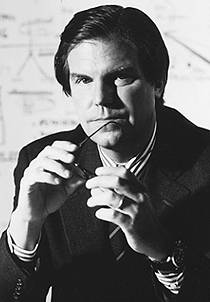In which the Guru of the Digital Generation discourses on McLuhan, electronic neighbors and square dancing
Nicholas Negroponte, 51, founding director of the Media Lab at MIT and Wired magazine’s popular columnist from its inception, is one of the leading lights of the digital revolution.
His 1995 book, “Being Digital,” looks at the implications of the new technologies for global communication, interpersonal relationships, censorship, and our very notions of reality. This transformative technology will fundamentally alter how we learn, how we work, how we entertain ourselves — essentially how we live.
J.D. Lasica caught up with Negroponte via modem on March 21, 1995, during the author’s world book tour.

Where are you right now? You mentioned in your e-mail last week that you were in Toyko, on your way to Zurich, Switzerland.
Gutersloh, Germany, which is about halfway between Hannover and Dusseldorf and is the home of Bertelsmann, one of the Media Lab’s sponsors.
Where are you at this moment? On an airplane, in a hotel?
In my hotel room, waiting to have dinner with the CEO.
What are you wearing? (This is to flesh out the piece. Honest.)
Pyjamas
OK, on to the book. At the Media Lab, you’ve been at the forefront of information technology for years. Are you surprised by the explosion of interest in technology and the Internet and the digital frontier in the past year or two?
No. If anything is a surprise, it is the rate, not the size.
Even mainstream magazines like Newsweek have begun devoting a great deal of coverage to the electronic revolution. What’s happening here?
Simple. Hit a critical mass.
Why is this happening now?
Because three things intersected: 1) WWW & Mosaic, the growth of personal computers, the Nintendo generation coming of age.
What lies behind this fascination with the digital frontier?
The generational gap intrigues people.
What is it in our being, in our souls, that is propelling us toward the digital life?
Being somewhat fed up with having things thrown at us all the time.
Polls show that over 60 percent of the American public has never heard of the Internet or the information superhighway, despite the massive amounts of publicity both have received in the past two years. What do you make of this?
Show you how wrong polls can be.
Do you sense that it’s not simply a lack of awareness, but also a resistance to some of these technological forces?
We all resist change, especially as we get older. Change is not necessarily fun.
Let’s talk about a middle-class family, with a couple of kids in school, in a typical suburban neighborhood. How do you foresee the Digital Age affecting the way they live in the coming years?
The effect will be through the kids. One specific example is that it might bring family closer into what used to be games and conversations in the 19th century.
Give us a glimpse of some of the things you see in store as far as computers as objects that we wear and as things that we incorporate into our daily lives without giving it a second thought.
Smart front door knobs that let you in without having to put down your groceries.
You write in your book, “My guess is that 1 billion people will be connected (to the Internet) by the year 2000.” That’s a staggering number. Aside from the projections based on the Net’s exponential growth over the past two years, why do you think one-fifth of humanity will be wired within five short years when it seems that so many people, especially in the developing world, can’t afford the basic necessities of life, much less a computer and modem?
(No response.)
How do you think the digital revolution will affect us culturally? Will it usher out America’s TV culture? A quarter century ago, Marshall McLuhan and others wrote about how media and television have altered our way of thinking to such a degree that the visual image, rather than the written word, is now the predominant force of our culture. (And if there’s any doubt of that, ask a teenager if she’d rather read Twain or watch MTV.)
Did kids prefer: reading Twain or square dancing?
You write, “The medium is not the message in a digital world.” My question, then, is: Will the trends that began in the Information Age — the emphasis on image and visuals over words and reading — continue in the Digital Age? Or is it the other way around?
In the digital world the answer is almost always both or neither.
Was McLuhan right about his era, but probably wrong about what new new era holds in store?
He was right about his era, but could not imagine this one.
If the revolution will be digitized, does that shoot to hell all the theories about how we’re moving into a post-literate society where reading isn’t necessary anymore?
The Net makes us read and write more. Will that change? Perhaps.
Does the Digital Age turn the rules of our visual culture upside down?
A bit, because we used to have such tiny left brains, shrunk to a pea by schooling. That will change.
You write about the new ways of socializing online. Don’t these new realities  I’m fascinated by the example you gave of electronic neighborhoods — also keep up separated, fragmented, compartmentalized from one another. Our real neighbors, for example?
I’m fascinated by the example you gave of electronic neighborhoods — also keep up separated, fragmented, compartmentalized from one another. Our real neighbors, for example?
Go easy on the word “real.” They are your physical neighbors. They are distinguised by having fact-to-face contact unmediated by electronics.
Don’t we lose something in the way of human contact in the bargain?
All evidence to date shows that kids who are on-line socialize much better face-to-face.
Given your optimistic nature, you seem to not dwell on the possible downsides of the digital revolution in your book. We all know most of the usual concerns about the digital age  invasion of privacy, digital vandalism and piracy, censorsh, chaos in the copyright realm. What do you think we need to be most concerned about as we move into this new world?
invasion of privacy, digital vandalism and piracy, censorsh, chaos in the copyright realm. What do you think we need to be most concerned about as we move into this new world?
Privacy is the big one.
Are you concerned about the possibility that we’re creating a two-tier society of the techno-elite and the techno-illiterate?
No, because it will not happen that way.
Some school districts can’t afford computers. In some areas, 30 kids have to share a 10-year-old computer with no modem. How do we remedy that?
Three Wired stories from now: the $200 PC, given free to all schools by clever means.
You write that “the information highway may be mostly hype today, but it is an understatement about tomorrow. It will exist beyond people’s wildest predictions.” Do you truly think we’re at the cusp of something historic? Are you exicited about living in this period in history?
Yes.
I am willing to answer more later. You have put more into your questions than I have into my answers.








wix.com
Nicholas Negroponte: The revolution will be digitized | JD Lasica